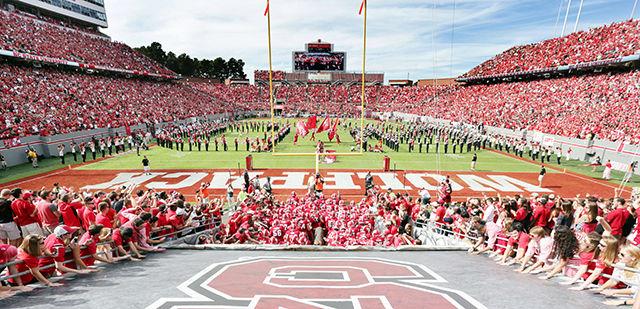This year, NC State is scoring a sustainability touchdown in Carter-Finley Stadium.
NC State’s Athletics Department and Waste Reduction and Recycling have teamed up this fall to implement a new system of compost bins in the stadium. The bins, which are gray with green lids, will stand alongside the landfill and recycling bins at various locations on the concourse and serve as the collection point for leftover food and food-related paper wastes. After being deposited in the bins, leftovers and wastes such as pizza boxes, napkins and paper plates will be recycled into soil amendment.
“Twenty compost stations will be available on the concourse of Carter-Finley Stadium to help Pack fans strive for zero waste,” said Lauren McKinnis, outreach coordinator for Waste Reduction and Recycling, who is in charge of the new composting initiative.
However, students and other fans must play their part in achieving this goal because McKinnis said items left in the stands will not be composted. Students can do their part by bringing any leftover food and food-related paper waste to the compost bins located on the concourse.
She said she hopes that the program will help Carter-Finley strive for zero waste by minimizing landfill additions, and this initiative will lead to an expansion of overall composting efforts throughout campus and an increase in education and awareness about composting on campus and in the community.
Lindsay Batchelor, program coordinator for Sustainability, is also excited about the composting system. Striving for zero waste has been a long-time goal at the stadium. “The WE Recycle program has been diverting recyclables from the landfill for the last 12 seasons,” she said. “Composting is the logical next step considering that food waste accounts for approximately 40 percent of the average waste stream.”
Compost from the stadium and the campus is taken to Brooks Contractor, owned by NC State Alumna Amy Brooks, where it is then processed into soil amendment that is used to grow flowers, trees and other plants.
This program has been successfully piloted at the Spring Football games for the past two years, and NC State Athletics and the Waste Reduction Recycling Office have decided to implement the initiative for the entire 2015 season during home football games. Similar programs exist at other schools, including Duke University and UNC-Charlotte; however, according to McKinnis, “NC State has the opportunity to be the largest stadium in North Carolina to offer composting inside [its] football stadium.”
Students are also excited about the prospect of a greener football game experience.
Cristina Guillen, a sophomore studying chemical engineering, said she thinks the initiative is a great start for a more sustainable future.
“I think it’s a great idea, and a great start,” Guillen said. “Obviously, there are going to be a lot of people there so the more people who see it, the more it will spread.”
Amelia Fujikawa, a senior studying environmental science and the leader of the NC State Stewards, a student-led sustainability group, said she definitely plans on participating. Fujikawa said spreading the word is one of the biggest forms of participation.
“I’m going to make sure to remind all of my friends before, on and during game days so that they know what to do with their food waste,” she said.
Student volunteers will be at the bins to help fans correctly deposit their wastes.
Guillen and Fujikawa said the new initiative will change the football game experience. Garnett Bullock, a junior, said the new option will only take a little bit of extra thought.
“Most fans don’t think about trash generated at football games,” Bullock said. “The composting volunteers have to be that buffer to make fans stop and think. I hope people are willing to put the small thought toward composting on game days.”
So, as the football season kicks off and the cheering to Pack victory begins, let’s move the chains toward a zero-waste season.
If any student groups have an interest in volunteering, they can contact the Waste Reduction and Recycling Office by emailing wrrstudent1@ncsu.edu. Groups must commit 18-20 volunteers for the entire game to help fans sort their waste, and registered on-campus groups and organizations will have an opportunity to earn a stipend for volunteering.








